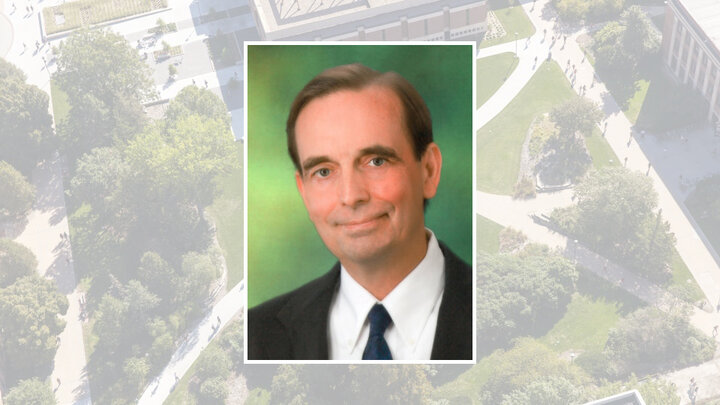At the recent Law-Psychology Program’s 40th Anniversary event, Richard Blunk announced the new Bruce Sales Law-Psychology Program Excellence Fund. The fund provides resources to the current Law-Psychology program and honors the influence Bruce Sales had on Richard when Richard was an undergraduate student at UNL in the mid-1970s. Eve Brank, Associate Professor of Psychology, asked Richard some questions about his undergraduate experiences and influence Dr. Sales had on him.
What were your memories of being an undergraduate at UNL?
Richard remembers spending a great deal of time in Schramm Hall and studying in the library cubicles. He did take some breaks from studying and had a part-time job as a security guard at Pershing Auditorium. Through that job he had the opportunity to meet Jerry Garcia and several other artists from the era.
How did you get involved in the Psychology Department?
Starting at UNL as an undeclared major, Richard enrolled in the Introduction to Psychology course with Dr. Don Jensen. He remembers Dr. Jensen showing lots of movies about rats. At the same time, Richard was enrolled in an introductory history course and other introductory courses, but psychology was what caught his attention. Psychology was intriguing and different from what he had been exposed to in high school. Soon after that semester, he declared psychology as his major. He went on to declare philosophy and English as two additional majors.
How did you start working with Bruce Sales?
Richard’s dad always told him he would be a doctor or a lawyer, but a short-lived experience working for a butcher convinced him a legal career was the better option. Knowing he wanted to go to law school, he sought out Dr. Bruce Sales to talk to about the new JD/PhD program at Nebraska. Bruce described the dual program to Richard, but also gave him general advice and insights about law school and how to make himself competitive to get into law school. Richard remembers Dr. Sales being very approachable and treating him as a professional. When Richard learned that doing an honors thesis would be helpful for his law school application, he sought out Dr. Sales as his advisor. Although Richard did not have a specific idea about the topic of his thesis, he knew he did not want to do a lab-based study. Instead, he wanted to develop the skills he would need when he became a lawyer. Together, Dr. Sales and Richard developed a project that examined persuasive techniques used in the voir dire process. Richard says he still uses those skills he learned while working on the project. The thesis is a published chapter in Psychology in the Legal Process (1977), a book edited by Dr. Sales. Similar to our current honors theses students today, Richard says he remembers struggling with how to make his thesis detailed enough to make it meaningful, but not overly detailed so it was too much to be meaningful.
What influence did Dr. Sales have on your decision to attend law school?
Richard came to UNL knowing he had the eventual goal of going to law school. The opportunity to work with Dr. Sales and publish the chapter with him was what Richard says set him apart from others when he was applying for law school and after law school. Dr. Sales also influenced Richard to think about dual programs. Although Richard did not choose the JD/PhD route, he did obtain a JD/MBA from the University of Texas partly because of his conversations with Dr. Sales about the benefits of dual degrees. Having the MBA has served Richard well as he has been able to better understand marketing, advertising, finance, and other parts of business.
How has your psychology undergraduate background helped you in your legal career (and life in general)?
He says he is more perceptive of people and how they present themselves. He also says that he is more attentive to people because of his background in psychology.
Do you have any advice for current students or recent graduates?
No one should be looking for a job because jobs come and go. Instead, students need to look for a career. The time students have in school is like a cocoon where there are worries, but it is still sheltered time. Richard suggests taking this time to get prepared and to truly think about where they want to go and what it will take to get there. Like Richard did with Dr. Sales, students should seek out the counsel of faculty and listen to their advice to help prepare for the “Serengeti Plain” of the real world where choices have real consequences and missteps can have long-range effects. And finally, the race doesn’t go to the fastest – it goes to the one who understands the rules of engagement.




